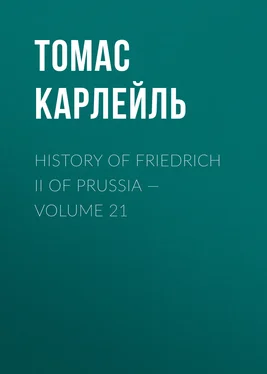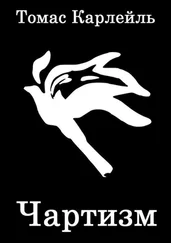Томас Карлейль - History of Friedrich II of Prussia — Volume 21
Здесь есть возможность читать онлайн «Томас Карлейль - History of Friedrich II of Prussia — Volume 21» — ознакомительный отрывок электронной книги совершенно бесплатно, а после прочтения отрывка купить полную версию. В некоторых случаях можно слушать аудио, скачать через торрент в формате fb2 и присутствует краткое содержание. Жанр: foreign_prose, История, literature_19, foreign_edu, foreign_antique, на английском языке. Описание произведения, (предисловие) а так же отзывы посетителей доступны на портале библиотеки ЛибКат.
- Название:History of Friedrich II of Prussia — Volume 21
- Автор:
- Жанр:
- Год:неизвестен
- ISBN:нет данных
- Рейтинг книги:3 / 5. Голосов: 1
-
Избранное:Добавить в избранное
- Отзывы:
-
Ваша оценка:
- 60
- 1
- 2
- 3
- 4
- 5
History of Friedrich II of Prussia — Volume 21: краткое содержание, описание и аннотация
Предлагаем к чтению аннотацию, описание, краткое содержание или предисловие (зависит от того, что написал сам автор книги «History of Friedrich II of Prussia — Volume 21»). Если вы не нашли необходимую информацию о книге — напишите в комментариях, мы постараемся отыскать её.
History of Friedrich II of Prussia — Volume 21 — читать онлайн ознакомительный отрывок
Ниже представлен текст книги, разбитый по страницам. Система сохранения места последней прочитанной страницы, позволяет с удобством читать онлайн бесплатно книгу «History of Friedrich II of Prussia — Volume 21», без необходимости каждый раз заново искать на чём Вы остановились. Поставьте закладку, и сможете в любой момент перейти на страницу, на которой закончили чтение.
Интервал:
Закладка:
OF FRIEDRICH'S NEW EXCISE SYSTEM
In his late Inspection-Journey to Cleve Country, D'Alembert, from Paris, by appointment waited for the King; [In ( OEuvres de Frederic, xxiv. 377-380 (D'Alembert's fine bits of Letters in prospect of Potsdam, "Paris, 7th March-29th April, 1763;" and two small Notes while there, "Sans-Souci, 6th July-15th August, 1763").]—picked up at Geldern (June 11th), as we saw above. D'Alembert got to Potsdam June 22d; stayed till middle of August. He had met the King once before, in 1755; who found him "a BON GARCON," as we then saw. D'Alembert was always, since that time, an agreeable, estimable little man to Friedrich. Age now about forty-six; has lately refused the fine Russian post of "Tutor to the Czarowitsh" (Czarowitsh Paul, poor little Boy of eight or nine, whom we, or Herr Busching for us, saw galloping about, not long since, "in his dressing-gown," under Panin's Tutorage); refuses now, in a delicate gradual manner, the fine Prussian post of Perpetual President, or Successor to Maupertuis;—definitely preferring his frugal pensions at Paris, and garret all his own there. Continues, especially after this two months' visit of 1763, one of the King's chief correspondents for the next twenty years. ["29th October, 1783," D'Alembert died: "born 16th November, 1717;"—a Foundling, as is well known; "Mother a Sister of Cardinal Tencin's; Father," accidental, "an Officer in the Artillery."] A man of much clear intellect; a thought SHRIEKY in his ways sometimes; but always prudent, rational, polite, and loyally recognizing Friedrich as a precious article in this world. Here is a word of D'Alembert's to Madame du Deffand, at Paris, some ten or twelve days after the Cleve meeting, and the third day after his arrival here:—
"POTSDAM, 25th JUNE, 1763. MADAME,—... I will not go into the praises of this Prince," King Friedrich, my now Host; "in my mouth it might be suspicious: I will merely send you two traits of him, which will indicate his way of thinking and feeling. When I spoke to him [at Geldern, probably, on our first meeting] of the glory he had acquired, he answered, with the greatest simplicity, That there was a furious discount to be deducted from said glory; that chance came in for almost the whole of it; and that he would far rather have done Ratine's ATHALIE than all this War:—ATHALIE is the work he likes, and rereads oftenest; I believe you won't disapprove his taste there. The other trait I have to give you is, That on the day [15th February last] of concluding this Peace, which is so glorious to him, some one saying, 'It is the finest day of your Majesty's life:' 'The finest day of life,' answered he, 'is the day on which one quits it.'...—Adieu, Madame." [ "OEuvres Posthumes de D'Alembert (Paris, 1799). i. 197:" cited in PREUSS, ii. 348.]
The meeting in Cleve Country was, no doubt, a very pretty passage, with Two pretty Months following;—and if it be true that HELVETIUS was a consequence, the 11th of June, 1763, may almost claim to be a kind of epoch in Friedrich's later history. The opulent and ingenious M. Helvetius, who wrote DE L'ESPRIT, and has got banished for that feat (lost in the gloom of London in those months), had been a mighty Tax-gatherer as well; D'Alembert, as brother Philosophe, was familiar with Helvetius. It is certain, also, King Friedrich, at this time, found he would require annually two million thalers more;—where to get them, seemed the impossibility. A General Krockow, who had long been in French Service, and is much about the King, was often recommending the French Excise system;—he is the Krockow of DOMSTADTL, and that SIEGE OF OLMUTZ, memorable to some of us:—"A wonderful Excise system," Krockow is often saying, in this time of straits. "Who completely understands it?" the King might ask. "Helvetius, against the world!" D'Alembert could justly answer. "Invite Helvetius to leave his London exile, and accept an asylum here, where he may be of vital use to me!" concludes Friedrich.
Helvetius came in March, 1765; stayed till June, 1766: [Rodenbeck, ii. 254; Preuss, iii. 11.]—within which time a French Excise system, which he had been devising and putting together, had just got in gear, and been in action for a month, to Helvetius's satisfaction. Who thereupon went his way, and never returned;—taking with him, as man and tax-gatherer, the King's lasting gratitude; but by no means that of the Prussian Nation, in his tax-gathering capacity! All Prussia, or all of it that fell under this Helvetius Excise system, united to condemn it, in all manner of dialects, louder and louder: here, for instance, is the utterance of Herr Hamann, himself a kind of Custom-house Clerk (at Konigsberg, in East Preussen), and on modest terms a Literary man of real merit and originality, who may be supposed to understand this subject: "And so," says Hamann, "the State has declared its own subjects incapable of managing its Finance system; and in this way has intrusted its heart, that is the purse of its subjects, to a company of Foreign Scoundrels, ignorant of everything relating to it!" ["Hamann to Jacobi" (see Preuss, iii. 1-35), "Konigsberg, 18th January, 1786."]
This lasted all Friedrich's lifetime; and gave rise to not a little buzzing, especially in its primary or incipient stages. It seems to have been one of the unsuccessfulest Finance adventures Friedrich ever engaged in. It cost his subjects infinite small trouble; awakened very great complaining; and, for the first time, real discontent,—skin-deep but sincere and universal,—against the misguided Vater Fritz. Much noisy absurdity there was upon it, at home, and especially abroad: "Griping miser," "greedy tyrant," and so forth! Deducting all which, everybody now admits that Friedrich's aim was excellent and proper; but nobody denies withal that the means were inconsiderate, of no profit in proportion to the trouble they gave, and improper to adopt unless the necessity compelled.
Friedrich is forbidden, or forbids himself, as we have often mentioned, to impose new taxes: and nevertheless now, on calculations deep, minute and no doubt exact, he judges That for meeting new attacks of War (or being ready to meet, which will oftenest mean averting them),—a thing which, as he has just seen, may concern the very existence of the State,—it is necessary that there should be on foot such and such quantities and kinds of Soldiery and War-furniture, visible to all neighbors; and privately in the Treasury never less than such and such a sum. To which end Arithmetic declares that there is required about Two Million thalers more of yearly revenue than we now have. And where, in these circumstances, are the means of raising such a sum?
Friedrich imposes no new taxes; but there may be stricter methods of levying the old;—there may, and in fact there must, be means found! Friedrich has consulted his Finance Ministers; put the question SERIATIM to these wise heads: they answer with one voice, "There are no means." [Rodenbeck, ii. 256.] Friedrich, therefore, has recourse to Helvetius; who, on due consideration, and after survey of much documentary and tabulary raw-material, is of opinion, That the Prussian Excises would, if levied with the punctuality, precision and vigilant exactitude of French methods, actually yield the required overplus. "Organize me the methods, then; get them put in action here; under French hands, if that be indispensable." Helvetius bethought him of what fittest French hands there were to his knowledge,—in France there are a great many hands flung idle in the present downbreak of finance there:—Helvetius appears to have selected, arranged and contrived in this matter with his best diligence. De Launay, the Head-engineer of the thing, was admitted by all Prussia, after Twenty-two years unfriendly experience of him, to have been a suitable and estimable person; a man of judicious ways, of no small intelligence, prudence, and of very great skill in administering business.
Читать дальшеИнтервал:
Закладка:
Похожие книги на «History of Friedrich II of Prussia — Volume 21»
Представляем Вашему вниманию похожие книги на «History of Friedrich II of Prussia — Volume 21» списком для выбора. Мы отобрали схожую по названию и смыслу литературу в надежде предоставить читателям больше вариантов отыскать новые, интересные, ещё непрочитанные произведения.
Обсуждение, отзывы о книге «History of Friedrich II of Prussia — Volume 21» и просто собственные мнения читателей. Оставьте ваши комментарии, напишите, что Вы думаете о произведении, его смысле или главных героях. Укажите что конкретно понравилось, а что нет, и почему Вы так считаете.









